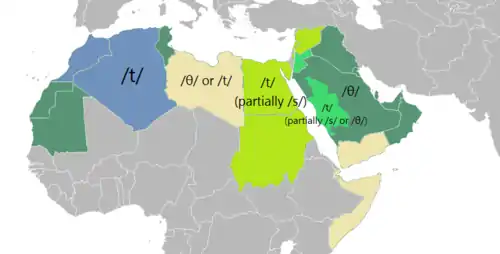Ṯāʾ
Ṯāʾ (ث) is one of the six letters the Arabic alphabet added to the twenty-two from the Phoenician alphabet (the others being ḫāʾ, ḏāl, ḍād, ẓāʾ, ġayn). In Modern Standard Arabic it represents the voiceless dental fricative [θ], also found in English as the "th" in words such as "thank" and "thin". In Persian, Urdu, and Kurdish it is pronounced as s as in "sister" in English.
| Ṯāʾ | |
|---|---|
| Phoenician | |
| Hebrew | - |
| Aramaic | |
| Syriac | - |
| Arabic | ث |
| Phonemic representation | θ (t, s) |
| Position in alphabet | 23 |
| Numerical value | 500 |
| Alphabetic derivatives of the Phoenician | |
| Greek | - |
| Latin | - |
| Cyrillic | - |
| Ṯāʾ | |
|---|---|
| ث | |
| Usage | |
| Writing system | Arabic script |
| Type | Abjad |
| Language of origin | Arabic language |
| Phonetic usage | θ |
| Alphabetical position | 4 |
| History | |
| Development |
|
| Other | |
| Writing direction | Right-to-left |

In name and shape, it is a variant of tāʾ (ت). Its numerical value is 500 (see Abjad numerals).
The Arabic letter ث is named ثَاءْ ṯāʾ. It is written in several ways depending in its position in the word:
| Position in word | Isolated | Final | Medial | Initial |
|---|---|---|---|---|
| Glyph form: (Help) |
ث | ـث | ـثـ | ثـ |
In contemporary spoken Arabic, pronunciation of ṯāʾ as [θ] is found in the Arabian Peninsula, Iraqi, and Tunisian and other dialects and in highly educated pronunciations of Modern Standard and Classical Arabic. Pronunciation of the letter varies between and within the various varieties of Arabic: while it is consistently pronounced as the voiceless dental plosive [t] in Maghrebi Arabic (except Tunisian and eastern Libyan), on the other hand in the Arabic varieties of the Mashriq (in the broad sense, including Egyptian, Sudanese and Levantine) and Hejazi Arabic, it can be pronounced as either [t] or as the sibilant voiceless alveolar fricative [s]. Depending on the word in question, words pronounced as [s] are generally more technical or "sophisticated." Regardless of these regional differences, the pattern of the speaker's variety of Arabic frequently intrudes into otherwise Modern Standard speech; this is widely accepted, and is the norm when speaking the mesolect known alternately as lugha wusṭā ("middling/compromise language") or ʿAmmiyyat/Dārijat al-Muṯaqqafīn ("Educated/Cultured Colloquial") used in the informal speech of educated Arabs of different countries.
When representing this sound in transliteration of Arabic into Hebrew, it is written as ת׳.
Common Semitic perspective
The choice of the letter tāʾ as the base for this letter was not due to etymology (see History of the Arabic alphabet), but rather due to phonetic similarity. For other Semitic cognates of the phoneme ṯ see Sound changes between Proto-Semitic and the daughter languages.
The South Arabian alphabet retained a symbol for ṯ (𐩻).
Character encodings
| Preview | ث | |
|---|---|---|
| Unicode name | ARABIC LETTER THEH | |
| Encodings | decimal | hex |
| Unicode | 1579 | U+062B |
| UTF-8 | 216 171 | D8 AB |
| Numeric character reference | ث | ث |